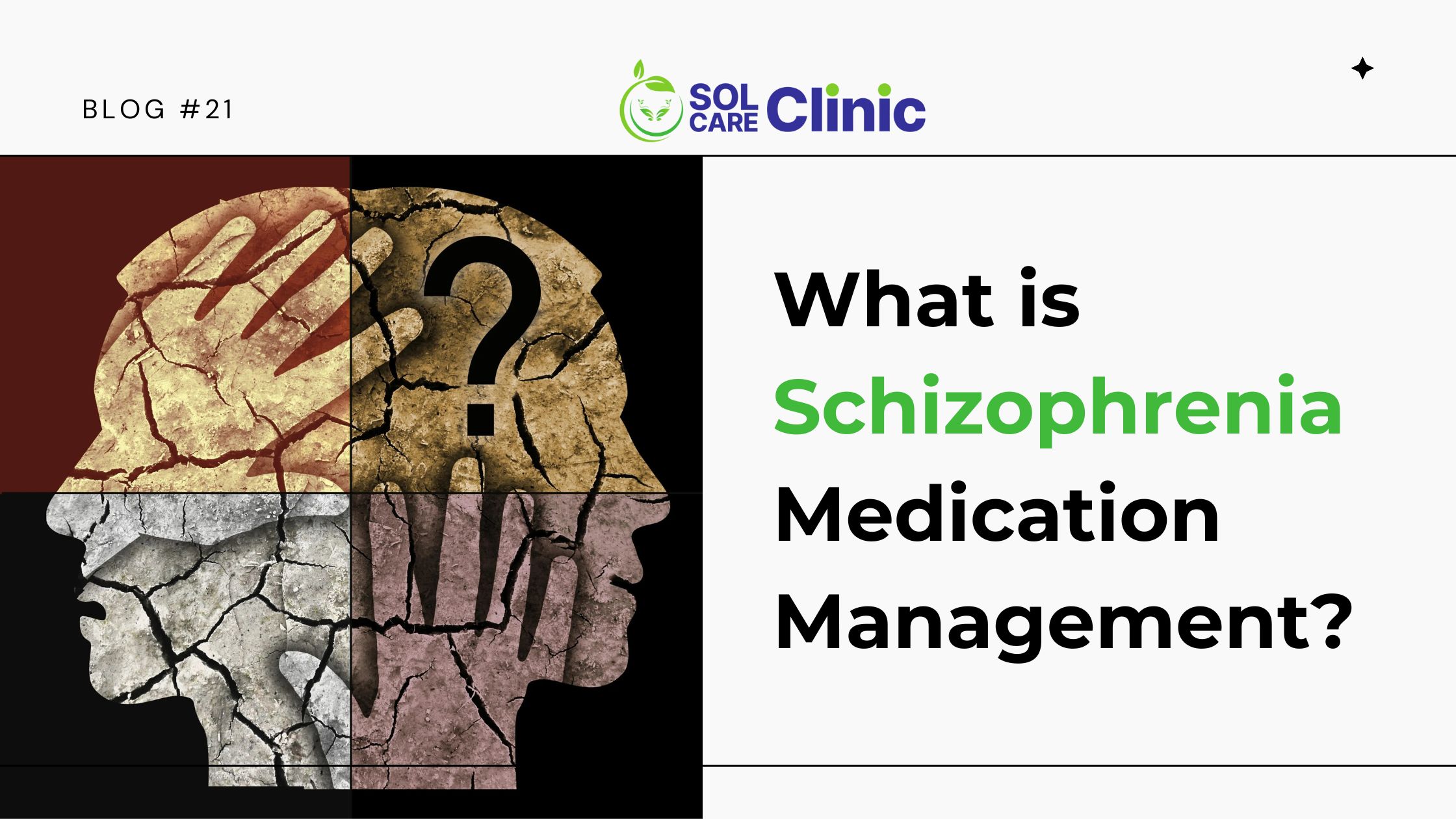Schizophrenia is a serious mental health condition that changes how a person thinks, feels, and acts. Common symptoms include hearing or seeing things that aren’t there (hallucinations), having false beliefs (delusions), and trouble thinking clearly. While it cannot be cured, treatment can control symptoms and improve life. A key part of treatment is managing medications, which helps patients take the right medicines at the right time.
What is Schizophrenia in Mental Health?
Schizophrenia is a complex and chronic mental health disorder that affects how a person thinks, feels, and behaves. It can cause disruptions in perception, thought processes, and emotional responses. The condition often begins in late adolescence or early adulthood, but it can occur at any age. While it’s a lifelong disorder, early diagnosis and treatment can significantly improve outcomes.
What are the types of Schizophrenia?
Schizophrenia can present in different forms, with varying symptoms and severity.
The types include:
- Paranoid Schizophrenia
- Key Features: Hallucinations and delusions are prominent.
- Behavior: Patients may be suspicious, believe others are plotting against them, or have an exaggerated sense of importance.
- Disorganized Schizophrenia
- Key Features: Disorganized speech, thinking, and behavior.
- Behavior: Patients may have difficulty with daily tasks, show inappropriate emotions, or speak in a way that’s hard to understand.
- Catatonic Schizophrenia
- Key Features: Disturbances in movement, such as staying still for long periods or making unusual gestures.
- Behavior: Patients may resist movement or follow repetitive, purposeless actions.
- Undifferentiated Schizophrenia
- Key Features: Symptoms don’t fit neatly into one specific category.
- Behavior: A mix of features from other types, such as hallucinations, disorganized speech, or motor issues.
- Residual Schizophrenia
- Key Features: Milder symptoms, often after treatment of a severe episode.
- Behavior: Patients may still experience some symptoms, like mild hallucinations or reduced motivation.
What are the signs and symptoms of Schizophrenia?
Schizophrenia symptoms are divided into three main categories:
1. Positive Symptoms
These are behaviors or experiences that are not typically present in healthy individuals:
- Hallucinations: Seeing, hearing, or feeling things that are not there (most commonly hearing voices).
- Delusions: Strong beliefs that are not based on reality, such as paranoia or feelings of grandiosity.
- Disorganized Speech: Talking in ways that are hard to follow or don’t make sense.
- Disorganized Behavior: Difficulty completing everyday tasks or behaving inappropriately.
2. Negative Symptoms
These involve a loss of normal functions:
- Reduced Emotional Expression: Flat or inappropriate facial expressions.
- Lack of Motivation: Difficulty starting or following through with activities.
- Social Withdrawal: Avoiding social interactions or activities.
- Reduced Speech: Speaking less or appearing uninterested in conversation.
3. Cognitive Symptoms
These affect a person’s thinking and memory:
- Trouble with Attention: Difficulty focusing on tasks or conversations.
- Poor Decision-Making: Struggling to make choices or solve problems.
- Memory Issues: Forgetting important details or being unable to recall events accurately.
What are the early warning signs?
Recognizing schizophrenia early can help start treatment sooner.
Some early warning signs include:
- Withdrawing from family and friends.
- Sudden drop in academic or work performance.
- Unusual or irrational thoughts and suspicions.
- Changes in sleeping patterns or personal hygiene.
- Increased sensitivity to sounds, lights, or touch.
- Difficulty distinguishing reality from imagination.
What is Medication Management for Schizophrenia?
Schizophrenia medication management is a process where doctors, patients, and sometimes family members work together to plan and monitor the use of prescribed medications. This helps control symptoms of schizophrenia, reduce side effects, and support the patient in living a more stable and fulfilling life. It ensures the treatment is effective and tailored to the patient’s needs.
Goals of Medication Management
- Control Symptoms: Help reduce hallucinations, delusions, and confusing thoughts.
- Prevent Relapse: Stop serious episodes that can affect daily life.
- Improve Functioning: Support patients in maintaining relationships, work, and hobbies.
- Minimize Side Effects: Make sure the medication works well while causing as little discomfort as possible.
What are the common medications for Schizophrenia?
Doctors may prescribe one or more medications depending on the patient’s needs:
1. Antipsychotics
- First-Generation (Typical): Older medications like haloperidol and chlorpromazine. These are effective but may cause more side effects.
- Second-Generation (Atypical): Newer medications like risperidone, olanzapine, and aripiprazole. These are usually preferred because they tend to have fewer side effects.
2. Mood Stabilizers: These help control mood swings and irritability. Some examples are lithium and valproate.
3. Antidepressants: These are used for patients who also have depression along with schizophrenia. Examples include sertraline and fluoxetine.
What are the steps in Schizophrenia Medication Management?
- Initial Assessment: The psychiatrist talks to the patient to understand their symptoms, health history, and lifestyle.
- Personalized Plan: A treatment plan is made that is tailored to the patient’s unique needs.
- Regular Monitoring: The patient will have follow-up visits to check if the medications are working and if any changes are needed.
- Education: The patient and their caregivers will learn about the medications, why they are important, and how to manage side effects.
- Support Tools: Tools like reminders, apps, or pill organizers can help patients stay on track with their medication schedule.
What are the challenges in Medication Management?
- Not Taking Medication as Prescribed: Some patients stop their medication because of side effects, embarrassment, or not fully understanding the treatment.
- Side Effects: Common problems like weight gain, feeling sleepy, or shaking can make it hard to stick with the medication. Finding ways to manage these can help patients stay on track.
- Cost: Medications can be expensive, and this can be a barrier for many families.
- Stigma: People may avoid or stop treatment because they are worried about being judged.
What are the tips for managing medication effectively?
- Create a Routine: Try to take your medication at the same time each day.
- Set Reminders: Use alarms, apps, or notes to help you remember.
- Talk to Your Doctor: Let them know if you experience any side effects or have concerns.
- Keep Up with Follow-Ups: Regular visits help make sure your treatment is on track.
- Take Care of Your Health: Eating well, staying active, and managing stress all help improve your overall health.
FAQs
- How long does it take for schizophrenia medication to work?
Most medications start showing effects in 1–2 weeks, but full benefits may take up to 6 weeks. - What if I miss a dose?
Take it as soon as you remember unless it’s close to your next dose. In that case, skip the missed dose. - Can schizophrenia be managed without medication?
Therapy and lifestyle changes help, but medication is usually necessary for symptom control. - What should I do about side effects?
Speak with your doctor. They may adjust the dose or suggest a different medication. - Can I stop taking my medication if I feel better?
No, stopping abruptly can lead to a relapse. Always consult your doctor first.
Conclusion
Schizophrenia medication management is an essential part of treatment. It helps control symptoms, prevent relapses, and improve quality of life. With the right plan and support from doctors, caregivers, and tools, individuals with schizophrenia can live more stable and fulfilling lives.





